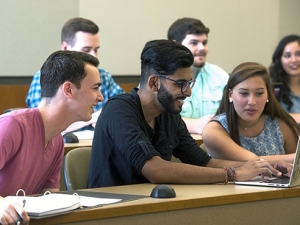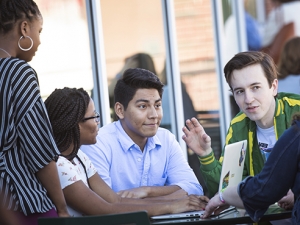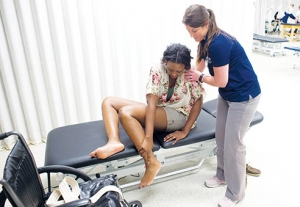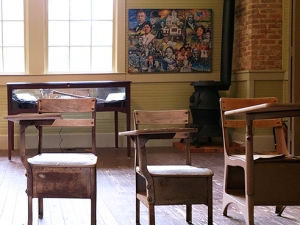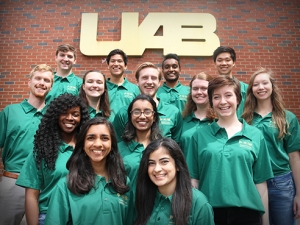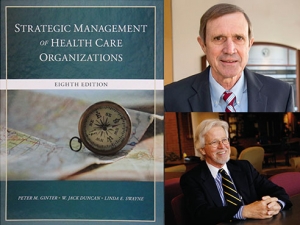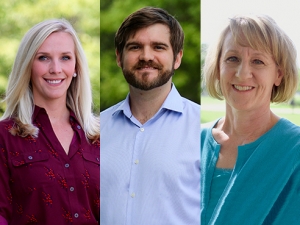As a student, Derek Moates had an extensive background in business and science, but he didn’t know how the two concepts worked together to produce products and profits.
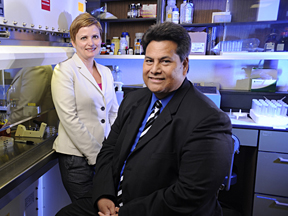 |
| Kathy Nugent and Tino Unlap are two of the leaders of the UAB biotechnology graduate certificate program. The program trains students in the science and business aspects of the field — a desired combination for many of today’s biotechnology employers. |
He found his answer when he entered a biotechnology graduate certificate program in the UAB Department of Clinical and Diagnostic Sciences. Today he works for a top biotech/communications firms in New York because of it.
“Education, combined with real industry opportunities, is the key to producing successful students who can hit the ground running,” says Moates, assistant account executive at Russo Partners, LLC. “Being able to communicate with CEOs in the Alabama biotechnology industry made my transition into the executive world, where I deal exclusively with C-level management, easier and stress-free.”
Kathy Nugent, Ph.D., director for the biotechnology program, citing the Battelle Report, says jobs in the field are growing at a rate of 14.4 percent compared to 4.3 percent in all other industries. More highly qualified graduates are needed to fill these well-paying jobs, and UAB’s program is attracting them; both classes in the program’s first two years enrolled the maximum 20 students.
“Our classes are designed for students to essentially wear a lab coat and a business suit at the same time,” Nugent says. “Biotech is not just discovering products. You have to know how to get those through clinical development and manage the regulatory issues. You have to know how to raise money for products in development. And you have to know how to commercialize them. It has created a demand for people who are uniquely trained in science and business.”
UAB started its program two years ago. School of Health Professions Dean Harold Jones, Ph.D., saw the need for the program after Birmingham lost out on a pharmaceutical manufacturing plant several years ago. While the plant actually was never awarded to any location due to changes in federal funding priorities, it became clear that the ability to produce a savvy workforce was critical to future success in attracting major bio-industry.
Nugent says UAB’s program has been made stronger by its partnership with the UAB Research Foundation, which enables students to work on real projects during their three semesters of course work.
The Research Foundation identifies and shares top technologies that need greater visibility and may develop as companies, and the students perform market analysis and create business plans, fact sheets, websites and other strategies.
“We want our students to have real experience, working on real projects with real companies,” Nugent says. “This gives them a chance to work on products that investigators here at UAB have developed. To our knowledge, there is no other program in the country like this.”
Nugent says the importance of understanding both worlds can’t be over-emphasized, especially investor financing. In biotech, there is a good chance another company is developing a drug in the same class at same time; it may even be a little more advanced.
“But let’s say that hypothetical company’s product fails its Phase III trial,” Nugent says. “Every analyst or investor that’s interested and following your company now will see your potential product as a greater risk. And the CEO will be asking, ‘How can we differentiate our product? You need to tell me now.’ These are the answers you need to know to be successful in this industry.”
Science-based program
Students in the program are expected to have a strong science background — to speak the language of biology, chemistry and genetics. The program also is laboratory-intense, and students have a great understanding of drug-discovery technologies when they graduate.
Associate Professor Tino Unlap, Ph.D., says the career possibilities are numerous: research, marketing, sales, public relations, business development, health-care policy, forensics, defense, drug development, teaching and industry regulation.
“They are generating products other industries depend on,” said Unlap. “It’s not just the health-care industry, its defense and computer science.”
“Biotechnology addresses environmental issues as well,” says Associate Professor Joe Garner, Ph.D. “Alternative energy will rise to meet those challenges.”
Recent graduates have received jobs at HudsonAlpha Institute for Biotechnology in Huntsville, Omega Biotech Inc. in Atlanta, Alpha Tec Systems in Vancouver, Wash., the Tennessee Department of Education and U.S. Department of Justice, among others.
UAB’s program also is well connected with the Biotechnology Association of Alabama — of which Nugent is president — and Blueprint Birmingham.
Nugent said companies have called the school to recruit for jobs. “They want more than a scientist,” Nugent says. “They want a scientist who understands the industry.”
Moates’ industry perspective gained him his dream job.
“This program has truly changed my entire life, and it helped me begin an executive-level career,” said Moates.
Students interested in the program should contact Tino Unlap at 934-7382. More information is available on the School of Health Professions website at www.uab.edu/biotech.

